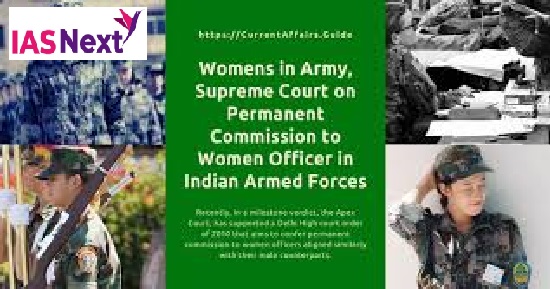CURRENT AFFAIRS
Get the most updated and recent current affair content on Padhaikaro.com
Permanent Commission for Women Officers
- IAS NEXT, Lucknow
- 15, Nov 2021

After the Supreme Court cautioned the Indian Army of contempt, the Centre has assured the court that it will roll out Permanent Commission (PC) option to all eligible women Army officers.
What’s the issue?
The Supreme Court in February 2020 directed the government to ensure that women officers in the Army be granted permanent commission (PC) as well as command postings in all services other than combat.
Lt. Col. Nitisha vs. Union of India Case: On 25th March 2021, the Supreme Court held that the Army’s selective evaluation process discriminated against and disproportionately affected women officers seeking permanent commission.
What is a Permanent Commission?
A Permanent Commission means a career in the army till retirement, while Short Service Commission is for 10 years, with the option of either leaving or opting for Permanent Commission at the end of 10 years. If an officer doesn’t get Permanent Commission then, the officer can choose a four-year extension.
Women in Army: Background of the case:
The induction of women officers in the Army started in 1992.
They were commissioned for a period of five years in certain chosen streams such as Army Education Corps, Corps of Signals, Intelligence Corps, and Corps of Engineers. Recruits under the Women Special Entry Scheme (WSES) had a shorter pre-commission training period than their male counterparts who were commissioned under the Short Service Commission (SSC) scheme.
- In 2006, the WSES scheme was replaced with the SSC scheme, which was extended to women officers. They were commissioned for a period of 10 years, extendable up to 14 years.
- Serving WSES officers were given the option to move to the new SSC scheme, or to continue under the erstwhile WSES. They were to be however, restricted to roles in streams specified earlier — which excluded combat arms such as infantry and armoured corps.
What was the main issue now?
While male SSC officers could opt for permanent commission at the end of 10 years of service, this option was not available to women officers. They were, thus, kept out of any command appointment, and could not qualify for government pension, which starts only after 20 years of service as an officer.
Why was the government against granting a permanent Commission?
- Motherhood, childcare, psychological limitations have a bearing on the employment of women officers in the Army.
- Family separation, career prospects of spouses, education of children, prolonged absence due to pregnancy, motherhood were a greater challenge for women to meet the exigencies of service.
- Physical limitations: Soldiers will be asked to work in difficult terrains, isolated posts and adverse climate conditions. Officers have to lead from the front. They should be in prime physical condition to undertake combat tasks. The Govt. said women were not fit to serve in ground combat roles.
- Behavioural and Psychological Challenges: Army units were a “unique all-male environment”. The presence of women officers would require “moderated behaviour”. The male troop predominantly comes from a rural background and may not be in a position to accept commands from a female leader.